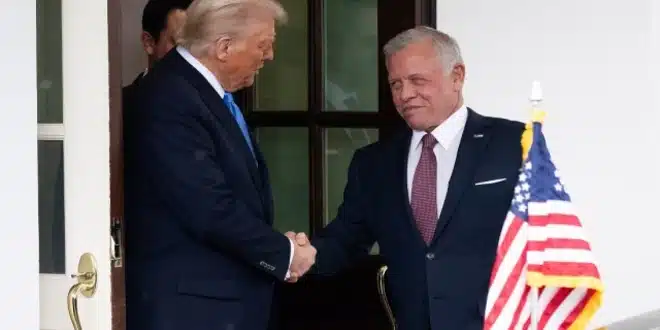U.S. President Donald Trump continues to push his controversial plan to relocate Palestinians and place a rebuilt Gaza under U.S. authority, despite opposition from Jordan’s King Abdullah II during a White House meeting.
Following discussions with Trump, King Abdullah reaffirmed Jordan’s firm stance against any forced displacement of Palestinians from Gaza and the West Bank.
“This is the unified Arab position,” Abdullah stated on social media, emphasizing that the priority should be on rebuilding Gaza without removing its people and addressing the worsening humanitarian crisis.
However, he also acknowledged that Egypt is preparing a proposal on how regional states could engage with the U.S. administration on the matter.
Jordan’s Offer and Trump’s Response
During the meeting, Abdullah appeared to make a goodwill gesture, proposing that Jordan could take in 2,000 Palestinian children with cancer who are in urgent need of medical care.
Trump, seemingly caught off guard by the offer, responded by calling it “a beautiful gesture”, admitting that he had not been informed about it prior to the meeting.
Trump’s Controversial Plan to “Own” Gaza
Trump shocked global leaders last week when he proposed that the United States “take over” Gaza, promising to transform it into “the Riviera of the Middle East”. However, his vision included the mass resettlement of Palestinians elsewhere, with no provisions for their return.
Despite widespread criticism, Trump doubled down on the plan, insisting that the U.S. would hold and control Gaza.
“We don’t have to buy it. We’re going to have Gaza,” Trump stated.
“We’re going to take it, we’re going to hold it, we’re going to cherish it.”
However, he dismissed speculation that he would use his real estate background to develop Gaza personally, stating: “No. I’ve had a great career in real estate.”
Egypt’s Response and Arab Opposition
Jordan is not alone in its opposition to Trump’s Gaza relocation plan.
Egyptian President Abdel Fattah al-Sisi, who is expected to visit the White House later this week, has already called for rebuilding Gaza without displacing Palestinians.
The Egyptian Foreign Ministry also released a statement confirming that it would soon present a “comprehensive reconstruction vision” for Gaza that ensures Palestinians remain on their land.
Trump’s Stance on Aid to Jordan and Egypt
Prior to King Abdullah’s visit, Trump had threatened to cut U.S. aid to Jordan if it refused to accept Palestinian refugees. However, after the White House meeting, he softened his tone, saying:
“I don’t have to threaten that. I do believe we’re above that.”
Nonetheless, analysts highlight that Jordan remains economically vulnerable to U.S. pressure, as it receives approximately $750 million in economic aid and $350 million in military assistance from Washington each year.
Trump’s Stance on Hamas and Ceasefire Tensions
The meeting took place amid growing concerns that the Gaza ceasefire is on the brink of collapse.
On Monday, Trump warned that “all hell” would break loose if Hamas failed to release all hostages by the weekend.
While Trump expressed doubt that Hamas would comply, he downplayed any long-term impact on the peace process, stating:
“It’s not going to take a long time. A bully is the weakest person, and they’re bullies. Hamas is bullies.”
Jordan’s Strategic Position and Risks
King Abdullah’s strong rejection of forced Palestinian displacement reflects Jordan’s unique position in the Israeli-Palestinian conflict.
With nearly half of Jordan’s 11 million people of Palestinian origin, any mass relocation could destabilize the country.
Following his meeting with Trump, Abdullah took to social media, reaffirming his commitment to Jordan’s stability and the well-being of its citizens—a clear message that he intends to resist U.S. pressure on the issue.
As regional leaders prepare for upcoming talks in Riyadh, Egypt is expected to present its alternative proposal, setting the stage for further diplomatic maneuvering over the future of Gaza and its people.


